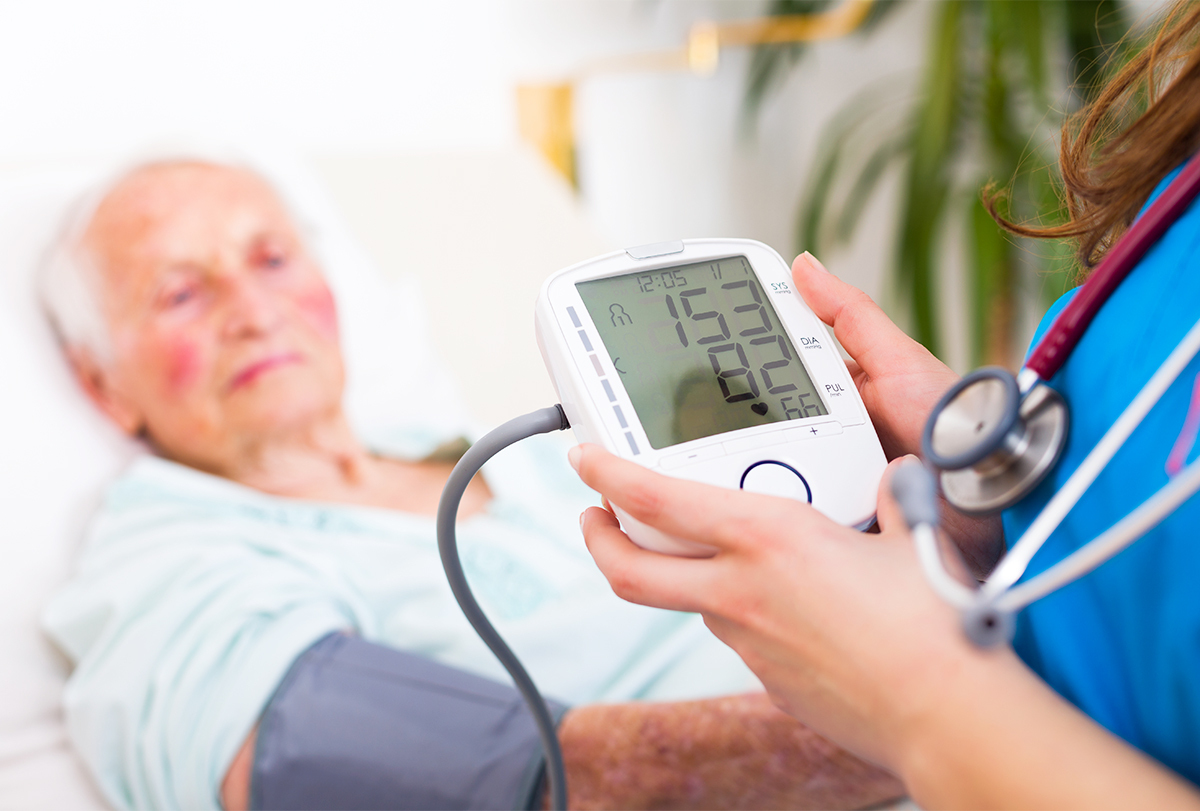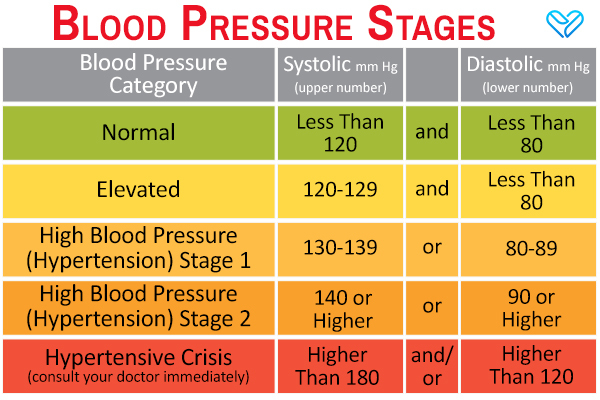In this article:
When the blood flows at abnormally high pressure through the arteries such that it exerts strain on the walls of the arteries, the condition is known as hypertension.

Some force is needed to allow the blood to flow through the arteries from the heart to the other parts of the body. However, too much pressure, over time, can lead to serious problems.
Normal Blood Pressure
Blood pressure is measured in millimeters of mercury (mmHg) with two numbers:
- Systolic blood pressure: Represented by the top number. It is a measure of the forces within the arteries when the heart beats.
- Diastolic blood pressure: Represented by the bottom number. It is a measure of the forces between heartbeats.
Normal blood pressure is 120/80 mmHg. Anything above this value is considered abnormal.
Types of Hypertension
The different types of hypertension are primary hypertension and secondary hypertension. (1)
Primary hypertension is the type of hypertension that has no identifiable cause and is thought to be related to genetics or environmental factors. Primary hypertension is the most common type.
Secondary hypertension, on the other hand, is the type of hypertension that results from an identifiable underlying cause.
Different Stages of Hypertension

Hypertension is divided into stages, based on the deviation from a healthy blood pressure range.
Elevated blood pressure is a systolic blood pressure of 120–129 mmHg and diastolic blood pressure below 80 mmHg. This is often referred to as prehypertension.
- Stage 1 hypertension is a systolic pressure of 130–139 mmHg or a diastolic pressure of 80–89 mmHg.
- Stage 2 hypertension is a systolic pressure of 140 mmHg or higher or a diastolic pressure of 90 mmHg or higher.
When the systolic pressure is higher than 180 mmHg and/or the diastolic pressure is higher than 120 mmHg, it is called a hypertensive crisis. (2) This is dangerously high blood pressure and one must see a physician right away, as pressures this high may lead to a heart attack, acute renal failure, or stroke.
Major Causes of Hypertension
Primary hypertension has no identifiable cause, but certain risk factors are associated with its development, including:
- Family history (genetics)
- Obesity
- Older age
- Race (Black people are more prone to hypertension)
- Sedentary lifestyle
- Tobacco use
- High-salt diet
Secondary hypertension may be caused by:
- Kidney disease
- Certain endocrine disorders
- Some medications such as anti-inflammatories and nonsteroidal anti-inflammatories, certain types of birth control pills, and stimulant medications used for weight loss
- Tobacco use (3)
- Too much alcohol (4)
- Some illegal drugs, such as cocaine (5)
- Thyroid problems, coarctation of the aorta (a congenital heart defect)
- Sleep apnea
Hypertension can also be commonly caused by high levels of stress and anxiety, during which the body releases certain hormones that can elevate blood pressure. (6)
ALSO READ: High Blood Pressure: Causes, Risk Factors, and Complications
Common Symptoms of Hypertension
People who have hypertension usually do not experience any symptoms, especially at the onset of the condition. However, over time, significantly elevated blood pressure can cause vision changes, headaches, ringing in the ears, and dizziness.
Management of Hypertension
Hypertension can be treated through lifestyle changes and the use of certain medications that work to lower blood pressure.
1. Management via medications
You may be prescribed antihypertensive medications to help lower your blood pressure. These include:
- Thiazide diuretics
- Angiotensin II receptor blockers
- Calcium channel blockers
- Angiotensin-converting enzyme blockers
Depending on your condition, you may require a combination of these medications, which may be needed for a lifetime. Therefore, it is advised to take your medications regularly and consult your doctor timely.
2. Management via dietary changes
A study found that the DASH diet, which is high in vegetables, fruits, low-fat dairy, and foods low in saturated fat, significantly lowered the blood pressure in the study participants. (7)
Moreover, the combination of the DASH diet and low-salt intake reduces blood pressure even more substantially than the DASH diet alone. (8)
Hence, if one has hypertension, the usually recommended dietary changes include:
- Limiting salt intake
- Decreasing the consumption of saturated and trans-fat, red meat, and sweets
- Increasing the consumption of vegetables, fruits, whole grains, low-fat dairy products, skinless poultry, and fish
3. Management via exercise
The American Heart Association recommends that adults participate in at least 150 minutes per week of moderate-intensity aerobic exercise (i.e., brisk walking) or at least 75 minutes per week of vigorous aerobic exercise (i.e., jogging, running) for good heart health. (9)
Adding at least 2 days per week of high-intensity activity (i.e., weight/strength training) provides even more health benefits, such as lowering blood pressure and cholesterol. (9)
Hypertension During Pregnancy

Some pregnant women may have chronic hypertension in pregnancy and others may have gestational hypertension (the development of hypertension during pregnancy).
Both of these conditions can be managed with certain blood pressure-lowering medications. However, untreated blood pressure during pregnancy increases the risk of:
- Cesarean delivery
- Preterm delivery
- Infant with low birth weight
- Preeclampsia, a condition characterized by protein in the urine, kidney problems, and liver problems
Women affected by gestational hypertension may experience severe lower extremity swelling, abdominal pain, confusion, headaches, vision changes, chest pain, and shortness of breath.
If you are pregnant and have hypertension, please be sure to notify your physician about any symptoms you may experience.
Final Word
Blood pressure readings above 120/80 mmHg are often indicative of hypertension. This can be caused by a number of factors. Therefore, it is imperative to schedule regular visits to your doctor for a proper, early diagnosis and suitable treatment.
A hypertensive individual must implement dietary and lifestyle changes along with the use of medications to manage his/her condition for the long term.
- Was this article helpful?
- YES, THANKS!NOT REALLY


